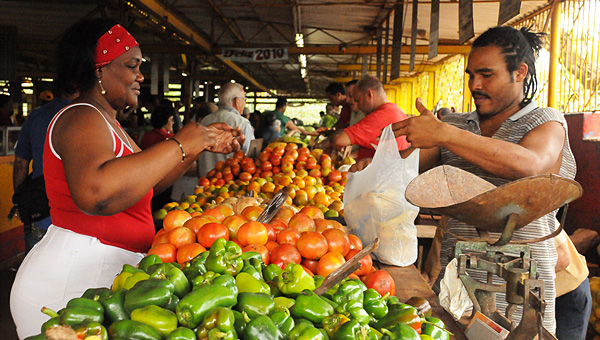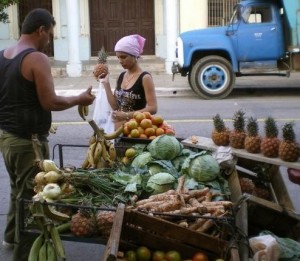Los intermediarios
Por Fernando Ravsberg 
(Havana) – Today, while walking agromercado stalls, full of fruits and vegetables, something made me go back 90 years when food distribution was monopolized by the state through mechanisms as strict as inefficient.
Cooking has always been my hobby but in those days was a real headache when I sold onions and garlic did not appear this was lost to the chili pepper, I could never make a dish with all ingredients.
Mercado agropecuario de La Habana (Foto: Raquel Pérez)
In the middle of the tropics was almost impossible to find fruits such as oranges, pineapple, mango or guava. The banana will never disappear completely but after a couple of years I was exclusively consume an ape man.
The vehicle that we were going to the countryside to buy from the farmers but we returned to the city as drug dealers, evading police to prevent the confiscation of potatoes that zealously hiding in the trunk.
As was discussed in the highest opening agricultural markets in the population was spread neuritis. Was decisive Deputy Health Minister statement demonstrating that the disease was caused by lack of vitamins and minerals.
The Dr.Terry was dismissed, but later was allowed farmers to sell their products directly to people at market prices. Interestingly the value of rice, down from $ 50 a pound CUP-black-market less than $ 10 in CUP agromercado.
Nevertheless, the state continued to resist accepting intermediaries. Began demanding that were the same peasants who moved and sold their products. He never explained who would then work the land.
Some leaders took it to extremes. When I went in Camaguey artisans told me that only allow them to sell certain days of the week because supposedly the rest of the time have to be making crafts.
To be fair to say that rejection is not only intermediaries of government. A farmer in the province of Matanzas said she angered me to see how the carriers and retailers earned more than those who work the land.
Since the food out of the hands of the farmer until they reach the consumer prices of some products are increased by up to 500% and even more if you count those sold illegally within the farmers’ markets.
As if this were not enough many scales are rigged, thus reducing weight further increases the price. And do not go by halves, I recently tried to sell a leg of pork weighing 5 kilos as if 9.
All criticism of the government and people to intermediaries have a real basis but often lose sight that these are also workers who are so essential and socially as they produce.
It is absurd to think that farmers will stop working to go to market or sell the artisans will paralyze the woodwork and go to the fair to offer their products to tourists. Many do not want or can not like it.
In any normal society requires the work of intermediaries and this is governed by rules. What it lacks in Cuba are not laws which prohibit, but regulations to facilitate the activity and prevent abuse.
A fair tax policy is an ideal mechanism to curb the excesses and redistribute the wealth of a country. In more socially advanced nations intermediaries know that the more they earn more removed from the treasury.
But they can be treated kindly, giving them the opportunity to buy new cars, fuel efficient engines, spare parts supply them, offering you, the new scales and bearings to the porters.
Establish clear, operational and facilities to collect fair taxes could be more productive than incite the people from the press stigmatizing intermediaries like those responsible for the shortage and high prices.
Sources: LettersFromCuba/FernandoRavsberg/R.Perez/ InternetPhotos/TheCubanHistory.com
Cartas Desde Cuba/ The Cuban History/ Arnoldo Varona, Editor
Los intermediarios
Por Fernando Ravsberg 
(Habana) – Hoy, mientras recorría los puestos del agromercado, repletos de frutas y vegetales, algo me hizo retroceder los años 90, cuando la distribución de alimentos era monopolizada por el Estado a través de mecanismos tan estrictos como ineficientes.
Cocinar siempre fue mi hobby pero en aquellos tiempos era un verdadero dolor de cabeza, cuando me vendían ajo no había cebolla y al aparecer ésta se perdía el ají pimiento, nunca pude elaborar un plato con todos sus ingredientes.
Mercado agropecuario de La Habana (Foto: Raquel Pérez)
En medio del trópico era casi imposible encontrar frutas como la naranja, la piña, el mango o la guayaba. El plátano nunca desapareció del todo pero al cabo de un par de años de consumirlo en exclusividad me sentía un hombre mono.
Los que teníamos vehículo íbamos al campo a comprarles a los campesinos pero regresábamos a la ciudad como traficantes de drogas, esquivando a la policía para evitar el decomiso de los boniatos que celosamente escondíamos en el maletero.
Mientras en las alturas se debatía la apertura de los agromercados, en la población se propagaba la neuritis. Fue decisiva la declaración del viceministro de Salud demostrando que la enfermedad era provocada por falta de vitaminas y minerales.
El Dr.Terry fue destituido, pero poco después se autorizó a los campesinos a vender sus productos directamente a la gente a precios de mercado. Curiosamente el valor del arroz, descendió de CUP$50 la libra -en el mercado negro- a menos de CUP$10 en el agromercado.
A pesar de todo, el Estado siguió resistiéndose a aceptar los intermediarios. Se empezó exigiendo que fueran los mismos campesinos los que trasladaran y vendieran sus productos. Nunca explicaron quién trabajaría entonces la tierra.
Algunos dirigentes lo llevaron a extremos. Cuando estuve en Camagüey los artesanos me contaron que solo les permiten vender algunos días de la semana porque supuestamente el resto del tiempo tienen que estar fabricando artesanías.
Para ser justos hay que decir que el rechazo a los intermediarios no viene solo del gobierno. Un campesino de la provincia de Matanzas me decía que le indignaba ver como los transportistas y los vendedores ganaban más que quienes trabajan la tierra.
Desde que los alimentos salen de las manos del campesino hasta que llegan al consumidor los precios de algunos productos se incrementan hasta en un 500% e incluso más si contamos los que se venden clandestinamente dentro de los agromercados.
Por si esto fuera poco muchas balanzas están trucadas, con lo que la reducción del peso incrementa aún más el precio. Y no se andan con chiquitas, hace poco me intentaron vender un pernil de puerco de 5 kilos como si pesara 9.
Todas las críticas del gobierno y la población a los intermediarios tienen una base real pero muchas veces se pierde de vista que estos son también trabajadores y que son tan imprescindibles socialmente como los que producen.
Es absurdo pensar que los campesinos van a dejar de trabajar para ir a vender a los mercados o que los artesanos van a paralizar la carpintería y acudir a la feria a ofrecer sus productos a los turistas. Muchos ni quieren ni pueden ni les gusta.
En cualquier sociedad normal se necesita el trabajo de los intermediarios y este está regido por normas. Lo que le falta a Cuba no son leyes que prohíban, sino regulaciones que faciliten la actividad e impidan los abusos.
Una política impositiva justa es un mecanismo ideal para limitar los excesos y redistribuir las riquezas de un país. En las naciones socialmente más avanzadas los intermediarios saben que cuanto más ganen más les quitará el fisco.
Pero también se les puede tratar amigablemente, dándoles la posibilidad de comprar vehículos nuevos, motores de bajo consumo, abastecerlos de repuestos, ofertarles balanzas nuevas y hasta rodamientos para los carretilleros.
Establecer normas claras, dar facilidades operativas y cobrar impuestos justos podría resultar más productivo que azuzar a la población desde la prensa estigmatizando a los intermediarios como si fueran los responsables de la escasez y los altos precios.
Sources: LettersFromCuba/FernandoRavsberg/R.Perez/ InternetPhotos/TheCubanHistory.com
Cartas Desde Cuba/ The Cuban History/ Arnoldo Varona, Editor




